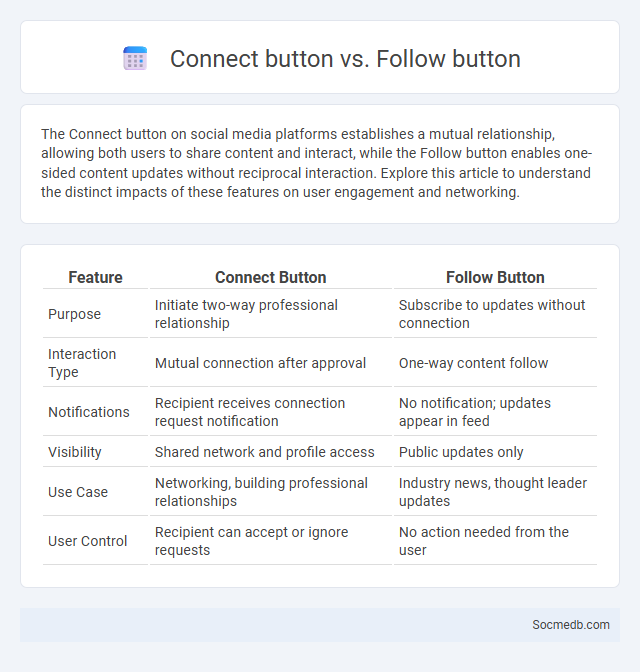
Photo illustration: Connect button vs Follow button
The Connect button on social media platforms establishes a mutual relationship, allowing both users to share content and interact, while the Follow button enables one-sided content updates without reciprocal interaction. Explore this article to understand the distinct impacts of these features on user engagement and networking.
Table of Comparison
| Feature | Connect Button | Follow Button |
|---|---|---|
| Purpose | Initiate two-way professional relationship | Subscribe to updates without connection |
| Interaction Type | Mutual connection after approval | One-way content follow |
| Notifications | Recipient receives connection request notification | No notification; updates appear in feed |
| Visibility | Shared network and profile access | Public updates only |
| Use Case | Networking, building professional relationships | Industry news, thought leader updates |
| User Control | Recipient can accept or ignore requests | No action needed from the user |
Understanding the “Connect” Button
The "Connect" button on social media platforms functions as a gateway for initiating interactions, enabling users to add friends, follow profiles, or join networks, thereby fostering community growth and engagement. This feature is often optimized to increase user connectivity by suggesting relevant contacts based on mutual interests, location, or existing connections. Understanding the nuances of the "Connect" button helps users leverage social media algorithms to build meaningful online relationships and expand their digital presence effectively.
What Does the “Follow” Button Mean?
The "Follow" button on social media platforms allows users to subscribe to another account's updates, enabling their posts, stories, or content to appear in the follower's feed. Following someone often indicates interest in their content, providing real-time notifications and fostering engagement with their activity. This feature helps users curate personalized content streams and build digital communities based on shared interests or influencers.
Defining a “Connection” on Professional Platforms
A "connection" on professional platforms such as LinkedIn represents a formal network tie between individuals often characterized by mutual consent to share professional information and opportunities. This linkage enables direct communication, access to each other's endorsements, recommendations, and career advancements. Unlike casual social media contacts, these connections emphasize credibility, industry relevance, and strategic career development.
Key Differences: Connect vs Follow
Connecting on social media involves mutual interaction where both parties agree to share content and communicate, fostering a two-way relationship built on engagement and trust. Following, in contrast, is a one-way action that allows users to receive updates from another without requiring reciprocation, emphasizing content consumption over personal interaction. Understanding these distinctions helps optimize social media strategies for networking or audience growth by targeting either deeper relationships or broader reach.
When Should You Use the “Connect” Option?
Use the "Connect" option on social media platforms when you want to establish a direct and meaningful relationship with someone, such as a potential business contact, collaborator, or professional peer. This feature is ideal during networking events, industry conferences, or after engaging with someone's content that aligns with your goals or interests. Prioritizing connection requests to relevant individuals enhances your social network's quality and fosters valuable opportunities for growth and collaboration.
Advantages of Following Without Connecting
Following social media accounts without connecting allows you to stay updated with the latest trends, news, and expert insights without the pressure of mutual interaction. This approach enables you to curate a personalized feed tailored to your interests while maintaining privacy and control over your online presence. You gain valuable information and inspiration effortlessly, enhancing your social media experience without the commitment of direct engagement.
Connection Requests: Etiquette and Best Practices
Connection requests on social media should be personalized and respectful, clearly stating your reason for reaching out to increase acceptance rates. Avoid sending generic messages or spamming multiple users, as this can damage your online reputation and reduce trust. Your approach to connection requests directly reflects your professionalism and can significantly impact your ability to build meaningful relationships.
Impact on Network Visibility and Reach
Social media platforms enhance network visibility by enabling real-time content sharing and increased user engagement across diverse audiences. Algorithms prioritize personalized content, amplifying reach through targeted recommendations and viral potential. Businesses leveraging analytics tools gain insights into consumer behavior, optimizing strategies to expand their network presence and influence.
Privacy Implications: Connect vs Follow
Understanding the privacy implications of social media actions is crucial for your online security. When you connect with someone, you typically grant mutual access to personal information, increasing data exposure risks, whereas following is a one-way interaction with limited data sharing. Managing your connections and followers carefully helps protect your privacy and control who can view your personal content.
Choosing the Right Engagement: Which Button to Use?
Choosing the right social media engagement button depends on your content goals and target audience preferences. Using the "Like" button fosters quick positive feedback, while "Comment" encourages meaningful interaction and deeper connections with your followers. Tailoring Your engagement strategy by selecting the appropriate button can significantly enhance Your online presence and community growth.
 socmedb.com
socmedb.com